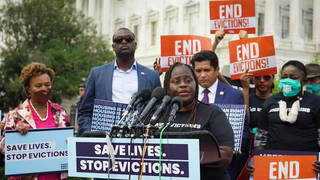
Related
Topics
Guests
- Cori BushDemocratic congressmember who represents Missouri’s 1st Congressional District.
We speak with Missouri Congressmember Cori Bush, who is formerly unhoused, about why she has been sleeping on the steps of the U.S. Capitol with others since Friday night to protest her colleagues’ decision to adjourn for August recess without passing an extension to the federal eviction moratorium, which expired July 31, as millions are behind on rent. Bush tells Democracy Now! she could not “walk away from this situation and go on vacation” knowing that millions of people could end up on the streets. “This isn’t easy. This is not performative in any way. I would rather be at home, but I understand the urgency and the need of this crisis right now,” Bush says.
Transcript
AMY GOODMAN: This is Democracy Now!, democracynow.org, The War and Peace Report. I’m Amy Goodman, as we turn now to Congressmember Cori Bush, who represents Missouri’s 1st Congressional District and has been sleeping on the steps of the U.S. Capitol with others since Friday night to protest her House colleagues adjourning for August recess without passing an extension on the eviction moratorium for renters, as nearly 12 million people are behind on rent. Congressmember Bush was formerly unhoused with her children. Her recent piece in Time magazine is headlined “I Lived in My Car and Now I’m in Congress.
We Need to Solve America’s Housing Crisis.”
Last week, Congressmember Bush introduced the Unhoused Bill of Rights, which she describes as “the first-ever federal legislation to declare the civil and human rights of unhoused individuals, particularly the right to sit, stand, sleep, or eat in public without fear of harassment or criminalization.”
Earlier today, Congressmember Bush tweeted, “5 AM. This morning felt cold, like the wind was blowing straight through my sleeping bag. Since Friday—when some colleagues chose early vacation over voting to prevent evictions—we’ve been at the Capitol. It’s an eviction emergency. Our people need an eviction moratorium. Now.”
She joins us from those same Capitol steps. Congressmember Bush, welcome back to Democracy Now! Talk about why you’ve been sleeping on the steps for days now.
REP. CORI BUSH: You know, the idea that lawmakers, the only ones — lawmakers, our government, the levels of government that have some type of jurisdiction with this type of a situation, with this crisis, chose not to do anything to stop this from becoming a crisis, on top of all of the crises we have going on in the country right now. I’m out here because there is no organization that can make this decision to have this moratorium in place. There is no — there’s no corporation. You know, there’s no, like, big-named family. There’s no wealthy person. There’s none of that, that can make the decision to make sure that between 7 and 11 million people don’t end up forced out of their homes. That is solely on the people in Congress, or, what we’ve been messaging, the White House and CDC working together in collaboration to get this done. And because that didn’t happen on last Friday, the House did not get that done, I could not at all walk away from this situation and go on vacation, recess, knowing that millions of people could start to end up on the streets. So, we just — I did what I know to do.
AMY GOODMAN: And talk about what it is you know to do.
REP. CORI BUSH: You know, I am an activist. I’m an organizer. I got my start, my official start, I guess I’d say, in activism after Michael Brown’s murder in Ferguson in 2014. And we protested more than 400 days. And even after that, we protested — we’ve protested for years against injustices related to police brutality and more, and even the housing crisis. There was no way that I can do that work at home in St. Louis and then come here and see an atrocity taking place, that I have a hand in, and just sit by and let it go.
So, this is what I asked for. I asked for the people of St. Louis to send me here to be able to represent them, every single one of them. And I asked them to send me here to bring the same energy that I had on the streets of Ferguson all of those nights, bring that here in Congress.
And so that’s what I did. I know how to go ahead and say, “Look, I’m going to protest this decision. I’m going to protest something that I know if we don’t do anything, people will be hurt.” And so that’s what we did. And we brought two chairs and set them on the steps and took a picture and posted it out and said, “Hey, we’re here. You know, come and join us.” And people did. And we’ve been here since Friday night.
AMY GOODMAN: You were joined by several congressmembers, is that right, Friday night? Ilhan Omar, Ayanna Pressley, all slept out on the steps?
REP. CORI BUSH: Yes, yes, slept on the steps. And let me just say that it’s not comfortable. We cannot lay. There is a law here that you cannot lay down on the Capitol steps. So we have to sit up in a chair or sit up on the steps. So that’s how we slept, sitting up. And we’ve done that every night since.
And it gets cold at night. It was really cold last night. Last night, I feel, was the coldest night since we’ve been out here. It was raining back and forth. And so, to have other members out here at night — Representative Mondaire Jones came out here last night. We have to have more bodies, more congressmembers to show up.
This is the thing: We can’t take the glory if we’re not willing to go through the grind. There is grind happening right now. So go through the grind. Don’t just start snatching glory.
Because let me tell you this: this is not — this isn’t easy. This is not performative in any way. I would rather be at home, but I understand the urgency and the need of this crisis right now. And so, my body, it hurts physically. I am walking slow, and I lost my voice. It’s just starting to come back. I’ve got a lot of honey on board right now and a lot of tea. I’m dizzy, I’m lightheaded. You know, I am so — I’m exhausted, emotionally and mentally. But it is nothing in comparison to what our unhoused community members face every single day, and what would happen if we send 7 to 11 million people out on the street.
AMY GOODMAN: So, how did this happen, Congressmember Bush? I mean, we’re not talking about a Republican-led House; we’re talking about a Democratic-led House. Nancy Pelosi went home to her house. How did — she’s the House speaker. How did this happen? This eviction moratorium was extended several times before, but now Congress just went out on recess? And what are you saying Pelosi should be able to do right now? What do you demand of President Biden?
REP. CORI BUSH: Our message has been clear for the last four days now, that we’re not just talking to one particular group or one particular person, saying, “Hey, you need to act,” because it’s such an urgent situation. So we’re saying everybody that has — everybody. We need to use all the tools in our toolbox right now. So we’ve been saying to House leadership, “Reconvene the House. Reconvene us.” Chairman Jim McGovern of the House Rules Committee came here to the steps, addressed the crowd, and he said that the Rules Committee is waiting. They are ready to come back and do the work. He said we will be back in a nanosecond if we hear that we have 218 votes. So they’re ready.
And so, we are saying, “Reconvene us. Let’s do the work to make sure that we get the whip count right, and then come back and let us get this vote.” Also, we’re still saying to the White House and to the CDC, you know, “Give us the moratorium. Give us the eviction moratorium.” We’re asking the president to pen the executive order. We need that done. And if there is a court challenge after that, we can deal with the court. That court challenge can be dealt with. In the meantime, though, while that is happening, if it happens, we will be able to, in the House, work on getting the bill that Chairwoman Maxine Waters has introduced, which extends — which has a moratorium until December the 31st. It’s just a must.
AMY GOODMAN: So, what about Pelosi calling on the CDC to extend the moratorium?
REP. CORI BUSH: Again, we have to use everything that we can. That was the route that she chose, was to say the CDC. We’re saying CDC, White House, House leadership. We’re even talking about the Senate. Come on. Like, we were all elected to serve the people. We didn’t sign up to say, “Oh, not people of low income. No, no, no, no. We’re not talking about you.” We didn’t — there was no document that I saw. And when I raised my hand, that was not a part of what I swore. So, my job is to make sure that I’m speaking up for the over 740,000 people in my district, to make sure that their basic needs are met, plus anything else that’s coming up that is within my wheelhouse to take care of. And the same thing for each and every one of the people that you just named, they have to do their work.
AMY GOODMAN: Congressmember Bush, can you talk about the Unhoused Bill of Rights, this unprecedented bill that you’ve just introduced?
REP. CORI BUSH: Sure. The Unhoused Bill of Rights is a resolution that — it lays out what those civil rights protections, what dignity looks like for our unhoused neighbors. We need to make sure that — because what we’ve seen is that the protections for our community members who are experiencing homelessness is — it just doesn’t seem like it’s respected at all. And this has been going on for such a long time, and it’s going on everywhere. And so, we decided to build a framework so that we can build legislation from this.
We want to make sure that we’re talking about every single thing that affects someone who is living unhoused, from hostile architecture, which I think is absolutely — I just can’t believe who comes up with these things, to want to take the bus stop bench and make it to where you can’t lay down on it. You know, those type of things. It’s unbelievable. And I think about when I was unhoused, when I was sleeping in a car, the one thing that I did have was the car.
And I never went into a shelter. I didn’t take my children into a shelter, because I felt like at least I have a car. You know, I have a place where we can at least lean back, where they can lay down. What about people who don’t have that? You know, when I think about last night, we were subject to everything that the weather decided to do. We couldn’t do — that was it. We were subject to the rain, the harsh downpours, the cold, the wind, all of that, and then the heat right now.
And so, making sure that people who are unhoused have access to restrooms — going to the restroom is a huge deal. Where do you go to the restroom? Think about how many times you go to the restroom in a day, and having a place to go. But when you are unhoused and you have to go to the restroom, you go into a store. They want you to buy something before you can use the restroom, you know, and just to clean up yourself. You can’t walk in and look a particular way and expect them to allow you to just use the facilities. So, this Bill of Rights says that the rights of every single person who is living unhoused, every person who’s experiencing homelessness, that their rights should be protected. They should have the same dignity of anyone who is living housed.
AMY GOODMAN: I mean, your story alone, Congressmember Bush, as you describe in the Time magazine piece, and as you were speaking just now, you lived in your car with your infant — right? — 6 months old, and your next child, not so much older. How did you go from being unhoused, living in the car, working at the same time you were living in the car, to beating a 10-term congressmember, standing on the steps of the Capitol, where you are sleeping outside and working inside?
REP. CORI BUSH: Yeah, yeah. So, I was able to basically get off the streets because my family — my family and a family friend helped, because they also understood that I didn’t have a place to put down on an application, a rental application, to say, you know, “Call this landlord to see about my rental history,” and so — which made it difficult to find a place, on top of the fact that I was very low-income, trying to raise two children. So, my family were helping me, but then also a family friend heard about it and just said, “Hey, I have a rental property. You can come and stay here until you all get on your feet.” And that is how we were able to finally come off the streets after living on the street and then living in one of those, you know, weekend — I mean, those extended-stay hotels.
But it was through that and a few other things, just seeing how people — it took somebody to notice what was going on, and it took someone to actually act. I think that is the other thing. It’s one thing to know. It’s one thing to say, “Yeah, you know, this should happen, and this should happen, this should happen.” But it’s another thing for somebody to act and change your situation. So, I saw that, and I — thank you! I saw that, and I pushed that forward. And so, the more and more — and I wanted to extend that to other people, because it was extended to me, and it saved my life, and it saved the lives of my children.
So, when Michael Brown was murdered — before Michael Brown was murdered, I was on the streets working with the unhoused community then, working in helping to fight sex trafficking in my community. I started to do that work to give back, and then Michael Brown was murdered. And I took to the streets to lend my hand as a medic and as clergy, still trying to do the same work to help my community, and just did not like the response that was coming from those that were in power that should have been able to help us and fix — and help us to fix that situation. And the community asked me to show up and to run, so I did.
AMY GOODMAN: What would permanent housing justice look like? I mean, even with the housing eviction moratorium, which has now expired, people owe back rent. How can they possibly pay this in this time? And as you were speaking, we were also showing video of people holding up signs: “You can’t stay at home when you don’t have a home.” We’re talking in the midst of a pandemic. If one person gets sick, we are all vulnerable.
REP. CORI BUSH: Yes, we are. We are. That’s why, with our Unhoused Bill of Rights, one thing that is built in is $140 billion. It’s a $200 billion bill, but it’s $140 billion that goes towards building of homes, so building of homes that are affordable for people. The homes that will be where someone who is — who has experienced homelessness for a very long time, this is a home that they would be able to acquire.
Not only that, if we are able to fix — because this bill talks about ending homelessness by 2025, completely eradicating homelessness. So, if we are able to eradicate homelessness with the Unhoused Bill of Rights, what we have right now, this crisis that should not be a crisis, when we have over $40 billion sitting right now that states and counties, other localities can use to help to make sure that some of this back rent is paid — if we need to go back and try to work on getting more funding, then we can do that. But right now what we have on the table, already out there, ready to go, that $40 billion, we have to move it. We have to move it, and we have to move it now, because we need — in order for people to stay in those homes, yes, we understand that landlords need to pay a mortgage company. So, that is why we’re also stressing to the states and to those localities to get that money moving and get it into the hands of the people who are supposed to have it.
AMY GOODMAN: Congressmember Bush, how long do you plan to sleep out on the Capitol steps? And how many people are you sleeping out there with?
REP. CORI BUSH: I’m out here until change happens. You know, I have never set a date. Let me tell you, one hour before we came out here, I didn’t know I would be out here, and didn’t know — each day, I didn’t know if there would be another day. And so, we’re going moment by moment. And when change happens, we can go home. One thing that we cannot do is we cannot say, “Well, we did all that we could do,” and not apply the pressure needed to make sure that people aren’t forced out of their homes. And I think that that’s just our work.
AMY GOODMAN: You have Supreme Court Justice Brett Kavanaugh warning last month, when the Supreme Court allowed a one-month extension of the eviction moratorium to stand, that any further extensions would have to go through Congress. So, what has the leadership said to you since they went home?
REP. CORI BUSH: So, what we are hearing is that, yes, that that is what — we’re hearing that that is what the CDC and that is what the administration is — what they’re looking at, to say, “OK, we cannot — we can’t do this. Congress has to act.” But what we’re saying is “Let’s do both. Let Congress act, and you do something that can happen immediately.” It could have happened, you know, on Friday. It could have happened before Friday. It could have happened on Saturday. We’re asking them to go ahead and do that, to at least buy us some time.
And, you know, we know what Brett Kavanaugh said. And as far as we’re concerned, his statement was not a Supreme Court ruling. His statement, out of his mouth, that was not a Supreme Court ruling. So, let the courts — if that’s what needs to happen, that’s not for us to worry about. The House, our job is to make sure that we’re legislating. And right now there is power in the pen of the president of the United States.
AMY GOODMAN: Well, I thank you so much for joining us, outside of the Capitol, outside the House, as you have been unhoused yourself and now a House member. Congressmember Cori Bush represents Missouri’s 1st Congressional District. Since Friday, she’s been sleeping on the steps of the Capitol to protest her House colleagues adjourning for August recess without passing an extension on the eviction moratorium for renters. Stay safe, Congressmember Bush.
REP. CORI BUSH: Thank you.
AMY GOODMAN: When we come back, we continue our conversation with the authors of Inflamed: Deep Medicine and the Anatomy of Injustice. And we’ll look at the connections between the pandemic and the climate crisis. We’ll look at a new film, The Ants and the Grasshopper. Stay with us.












Media Options